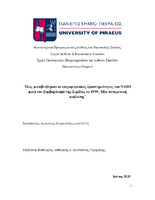Πως μεταβλήθηκαν οι επιχειρησιακές δραστηριότητες του ΝΑΤΟ μετά τον βομβαρδισμό της Σερβίας το 1999 : μία συγκριτική ανάλυση

View/
Keywords
ΝΑΤΟ ; Σερβία ; ΑφγανιστάνAbstract
Nato is one of the most important stabilizers in the global scene. The participation and cooperation of many strong states in the alliance has given responsibilities to the organization to manage global crises and function supplementary in many military and non-military operations. One of those challenges that NATO wanted to be involved in was the humanitarian crises caused by Slobo’s oppression of Muslim-Albanians located in Kosovo. The way NATO handled the situation, resulting in Serbia’s bombing in 1999, without the UN Security Council approval, created a general suspicion around the responsibilities an International Organization, such as NATO, should have as well as a general question as to why such an alliance should exist in the first place. This thesis explores the sequence of mistakes that led to the final decision of Serbia’s bombing.
A comparative study is also included, analyzing NATO’s involvement in the Global War on Terror, starting the exact next day of the tragic terrorist attack on the WTC on September 11, 2001. This way, one can notice the difference in the behavior of NATO in both operations, related to organization as well as execution of plans.
The hasty decision making, the unjustified carelessness, the refusal of diplomatic solutions/conversations as well as the illegal action of Serbia’s bombing led the alliance to think through its future and its responsibilities and how they are carried out. The dramatic change on how NATO integrated new structure and new plans in its actions in just 3 years, in the organization’s supportive operation in Afghanistan, shows exactly that NATO is capable of learning from old mistakes and of learning to adapt in the “new war” that is terrorism.
The failure of that operation does not degrade the importance of NATO’s presence in the area. It just makes us wonder whether there should be a limit on where NATO should be involved and in what way. Should a military/defensive organization be included in non-military/administrative operations and to what extent? The only thing left to know is whether the alliance’s involvement in Afghanistan is yet another lesson to learn, a lesson very useful in the ongoing war in Ukraine as well as in the crisis in the middle east, with Israel and Iran orchestrating another global crises.


